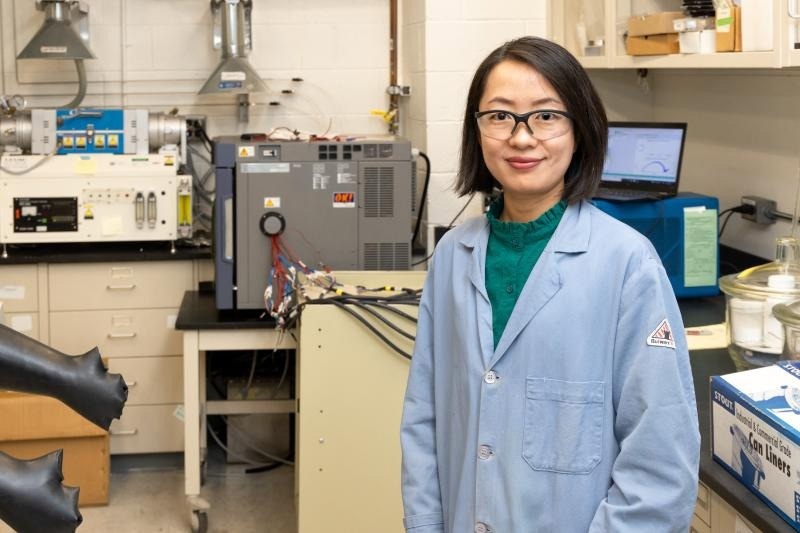Feb 19 2024
Chelsea Chen, a polymer physicist at Oak Ridge National Laboratory of the Department of Energy, is researching ion transport in solid electrolytes to extend the life of electric car batteries.

Chelsea Chen, Polymer Physicist at ORNL, stands in front of an eight-channel potentiostat and temperature chamber used for battery and electrochemical testing. Image Credit: Genevieve Martin, Oak Ridge National Laboratory, Department of Energy
The challenge with current EVs is to further increase driving range, and that means higher energy density, and this requires revolutionary design of the battery chemistry.
Chelsea Chen, Polymer Physicist, Department of Energy, Oak Ridge National Laboratory
Chen is studying solid polymer electrolytes as a solution to this.
Solid-state electrolytes are the key to higher energy density. Polymers encounter both the cathode and the anode in EV batteries. Understanding and optimizing the structure and properties at the interface is the key to improving the performance of solid-state batteries.
Chelsea Chen, Polymer Physicist, Department of Energy, Oak Ridge National Laboratory
Just the ‘FaCTs’
Chen is a staff researcher affiliated with the Fast and Cooperative Ion Transport in Polymer-Based Materials (FaCT) center, which is among the 16 recently funded DOE Energy Frontier Research Centers. These centers primarily collaborate with universities and national laboratories nationwide, dedicated to tackling crucial scientific challenges at the forefront of fundamental energy science research.
Chen's work at ORNL focuses on the development of solid-state batteries and the study of ion transport at the interfaces of electrolytes and electrodes, as well as in polymer-ceramic composite electrolytes.
A metal anode made of lithium is used in popular high-energy density designs. However, in current lithium-ion batteries, lithium interacts easily with liquid electrolytes, raising questions about fire safety.
A solution may be provided by solid-state electrolytes, which boost energy density when combined with a high-voltage cathode and a lithium metal anode.
The Path to Now
Chen was born in northeast China. Chemistry was her favorite subject in high school. Chen said, “I was always interested in the titration experiments, seeing how one material reacts with another.”
At Shanghai Jiao Tong University in China, Chen was surrounded by experts in polymers while pursuing her undergraduate degree.
Chen said, “They have a big polymer program housed in their chemistry department, and I worked with so many professors who specialized in polymers.”
Chen received her Ph.D. in Macromolecular Science and Engineering from the University of Michigan, where she worked on a dissertation that addressed the spatial distribution management of nanoparticles inside a thin-film polymer host.
She conducted her postdoctoral work at Lawrence Berkeley National Laboratory and the University of California, Berkeley, where she used small-angle X-Ray scattering and electron microscopy to examine the structure of polymers.
Understanding the structures, characteristics, and behaviors of polymers has been the foundation of Chen's work. Chen was a Senior Chemist at Dow Chemical before returning to ORNL in 2017 to join the Materials Science and Technology Division.
There, she concentrated on creating polymer dielectric films for semiconductor applications with higher mechanical flexibility and thermal conductivity.
Chen recognized that, despite being employed in her area, research and development were her passion.
"I have always wanted to do more fundamental research, which you cannot do in the commercial sector," said Chen. In 2017, she went back to her national laboratory roots as she " wanted to work in an institution where R&D is the focus."
Chen is enjoying working in a national lab and has embraced the change in environment.
Chen added, “The number one difference is that here, the science output is the most important thing.”
Chen was awarded the 2022 Young Investigator Award by the American Chemical Society for dedicating her commitment to publishing research conducted at ORNL.
She is especially grateful for the interdisciplinary teamwork.
Chen said, “University work is very siloed, and my favorite thing about the lab is that I can access an expert in any field if I have a problem or question. They are all right here.”
The Future of Plastics
Chen is interested in the fate of polymer goods in general, not only electrolytes for EV batteries. This is why she gathers her data.
While discussing the packaging industry and consumer plastics, Chen stated, “We should really be reusing polymers for something else instead of discarding them into the ocean. Unfortunately, it is cheaper to make new ones instead of recycling.”
Manufacturers are interested in recycling spent batteries to recover minerals like nickel, cobalt, and lithium to increase the sustainability of EV batteries. According to Chen, polymers should be treated equally when it comes to recycling.
Through recycling and upcycling, Chen's work improves sustainable chemistry—imagine shoes made of water bottles. She expects that studies like hers will aid the public and private sectors in thinking about and addressing end-of-life concerns in the design of polymers.
Chen's study is funded by the DOE Office of Energy Efficiency and Renewable Energy and the DOE Office of Science. Her work frequently makes use of the DOE Office of Science user facilities at ORNL, the Spallation Neutron Source, and the Center for Nanophase Materials Sciences.